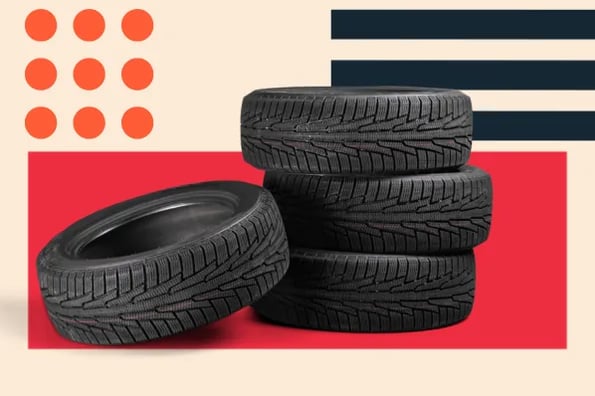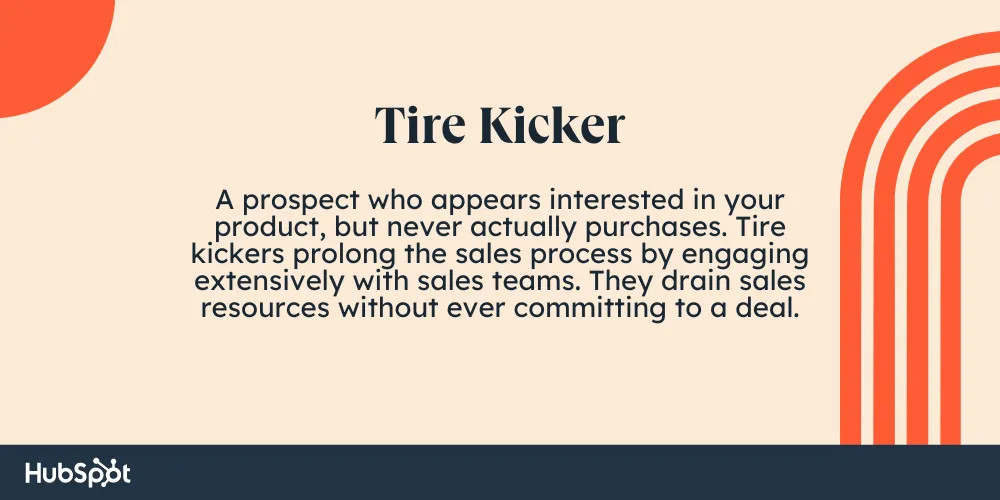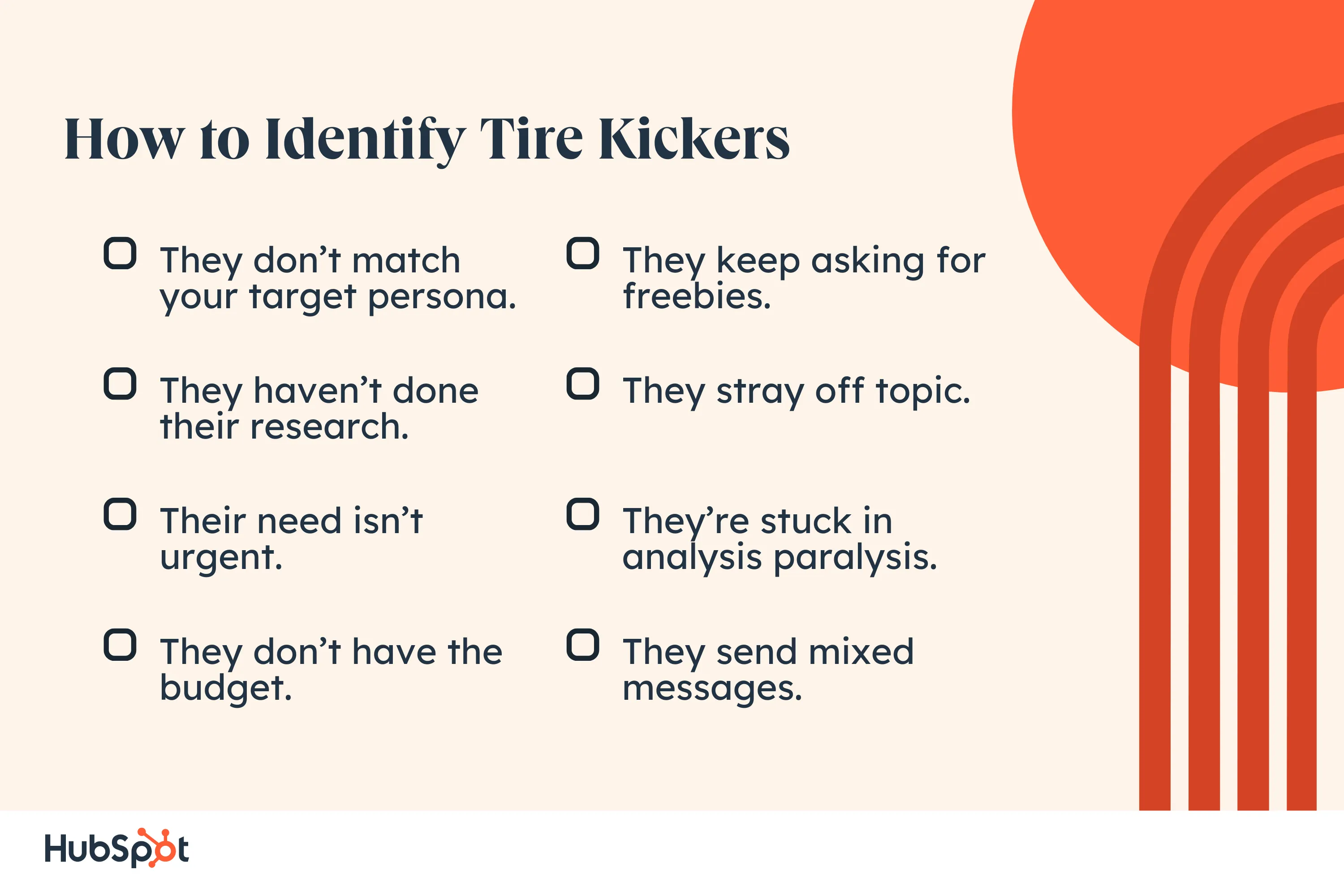As a sales rep, it’s only natural to want to close every lead you talk to. But if you’re dealing with a tire kicker, it’s critical to cut your losses and move on.

What makes someone a tire kicker? These prospects drag their feet, haggle endlessly, and beat around the bush. They waste your time and keep you from working the quality leads that are much more likely to actually buy.
In this article, we'll explore how to identify tire kickers so you know where to focus your attention.
Table of Contents
- What is a tire kicker?
- How to Identify Tire Kickers
What is a tire kicker?
A prospect who appears interested in your product, but never actually purchases. Tire kickers prolong the sales process by engaging extensively with sales teams, asking lots of questions, or raising endless objections. They drain sales resources without ever committing to a deal.
Successful sales teams quickly remove tire kickers from their pipelines, freeing reps to focus their time and energy on better opportunities.
As sales expert Marc Wayshak recommends, “Stop trying to close every single person you get in front of. As soon as you determine that a prospect isn’t a good fit, move on.”
Quality over quantity.
Of course, it’s not always easy to distinguish a tire kicker from a qualified prospect. To identify tire kickers, expert sales leaders suggest looking out for the following warning signs.

How to Identify Tire Kickers
- They don’t match your target persona.
- They haven’t done their research.
- Their need isn’t urgent.
- They don’t have the budget.
- They keep asking for freebies.
- They stray off topic.
- They’re stuck in analysis paralysis.
- They send mixed messages.
1. They don't match your target persona.
The first sign of a likely tire kicker is that they don’t match your customer profile or target persona. To determine whether a prospect is likely to be a good fit, ask yourself the following questions:
- Are they in the industry or territory you’re targeting?
- Do they align with the demographics of your target buyer?
- Does your product or service fill a pressing need for them?
Pro tip: It’s not just about demographic box-checking. Expert Steve Clark notes, “When creating a buyer persona, one must take into account more than just demographics. Motivations, interests, design preferences, and purchasing behaviors should all be taken into account.”
If a prospect doesn't meet the criteria that you set, then they’re not likely to convert — and so they’re not worth your time.
2. They haven’t done their research.
According to a recent report, more than 80% of shoppers do their own research before making a purchase. Educating prospects is part of the sales journey. However, if a lead doesn’t seem to have done any homework on your product, it might be a sign that they’re just kicking tires.
A study from Gartner found that serious B2B buyers spend more than twice as much time doing independent research than they do talking to potential suppliers.
Whether you’re a B2B or B2C business, the people who are most likely to buy usually come to you with at least an idea of what your business does.
Consumers and companies that haven’t taken the time to learn about your value proposition are less likely to have a pressing need for your product. It’ll take a lot longer for you to nurture and educate them through discovery calls, marketing emails, and other efforts.
Pro tip: You shouldn’t rule out these leads entirely. But if you spend too much time on these low-yield prospects, it’ll cut into the resources you have left to pursue the leads who are more likely to make a purchase.
3. Their need isn’t urgent.
Another tell-tale sign of a tire kicker is a lack of urgency. If they aren’t demonstrating a pressing need for your products or services, they’re unlikely to buy them.
“For serious buyers, time is money, and projects usually run on a deadline,” explains Kathleen Smith, marketing and sales consultant. “If someone can’t say when they might be ready to buy, they’re probably not serious about buying anytime soon.”
To determine how urgent a prospect’s need is, ask yourself the following questions:
- Are they highly motivated to solve their problem?
- Do they have a timeline for when the problem needs to be resolved?
- Is there another issue they care about more that will compete for their attention?
Evaluate if the lead isn't highly motivated to solve their problem, or if they don’t have a clear timeline in mind. Perhaps they’ve got other, more urgent issues to resolve. They might not be ready to make a purchase.
Pro tip: For leads who don’t have an urgent need for your offering, keep in touch via educational materials or newsletter. This keeps you in their mind without pushing a sale on them.
4. They don’t have the budget.
You can’t close a deal with someone who doesn’t have the budget to pay for your products. A prospect may be genuinely interested in your business. They may even have a pressing need. However, if they aren’t able to foot the bill, they’ll ultimately just be a waste of your time.
There are different barriers that can keep someone from being able to purchase. Some leads might be unable to afford your prices, while others may not have the authority to make buying decisions. Whatever the cause, note if a prospect seems unwilling to pay anything close to your rates, makes excessive budget objections, or haggles constantly. They may not be really interested in or capable of buying.
Pro tip: Author Aja Frost recommends a transparent approach to letting prospects know that there isn’t a budget fit. “Rather than abandoning the deal with no warning, let your prospect down gently by saying, ‘Given what you’ve told me about your budget, I don’t believe our product is the right fit for you,’” she says.
It’s always worth maintaining a positive relationship with potential customers. Even if they can’t buy today, they could be back tomorrow with a bigger budget or the approvals they need to spend it. So keep the door open for future conversations.
When possible, see if you can find free tools or resources that might help these leads in the meantime. However, don’t let them clog up your pipeline for too long.

5. They keep asking for freebies.
Many sales processes include free offerings to help move prospects through the pipeline. Whether it’s educational content like a webinar or informational call, a free trial, or some other discount, these giveaways can help turn leads into paying customers. As such, they’re an important tool in a sales rep’s toolbox.
That being said, you’ll sometimes run into prospects who seem to only be interested in the freebies. These tire kickers will happily take advantage of whatever free resources you’re willing to provide. But when it comes time to pay for a product or service, they drag their feet.
Pro tip: As Business Strategist Kristen Miller warns, “Freebies attract freebie-seekers and tire kickers. Often, spammers too. Now, I’m not saying you’re never to offer free lead magnets, not at all. We’re all here to add value to this world. But if you’re just starting out, then you’ll exhaust yourself by constantly coming up with freebies only to attract the lowest level potential clients possible.”
This can be a tricky balance to strike, as freebies certainly play a major role in many sales cycles. But if you’ve got a lead who loves a free lunch but won’t pay for dinner, it might be time to part ways.
6. They stray off topic.
Building personal relationships with customers is an important part of many sales processes. That means leaving room for conversations to flow (and sometimes into unpredictable territory). But if a prospect strays far from the planned agenda, repeatedly goes off on unrelated tangents, or seems to be shooting the breeze, you might be talking to a tire kicker.
It’s not always obvious when this is happening. A conversation may seem to be staying focused. Then, before you know it, you’ve spent an hour answering countless questions about your company’s products and services. You may end up providing detailed information about minor features or offering general, consultative advice without any firm commitments.
Pro tip: To keep your conversations on track, Enterprise Sales Leader Josh Gillespie suggests, "While there’s nothing wrong with being friendly and personable, if your sales conversations with a specific prospect are constantly wandering off-topic, trust your gut and take action.”
Taking a few minutes to build rapport is crucial to earning a prospect’s trust, but you also have to protect your own schedule. So make sure to outline an agenda for each call or meeting. If a lead seems to take control of every conversation and veer off track, you may be unable to make much progress.

7. They’re stuck in analysis paralysis.
Beware of prospects who seem frozen by fear or unable to decide on anything. These tire kickers suffer from analysis paralysis. They’re so afraid of making the wrong choice that they never end up settling on a solution.
To avoid buyer’s remorse, they pepper you with time-consuming demands for reassurance about your product or service. Nothing you say seems to be enough to address their concerns.
Pro tip: Leslie Ye, a sales expert, emphasizes the importance of validating prospects’ concerns. She suggests that if you’re selling a complex software solution, you might reassure a potential client by saying, “I understand, implementing new software can feel like a daunting task. Thankfully, we have an incredible tech team that has experience working with similar organizations and can handle a seamless transition for you.”
If a prospect remains hesitant after you’ve acknowledged their fears and offered solutions, it might mean you’re dealing with a tire kicker.
Of course, some amount of hesitation is to be expected, especially from first-time buyers. But if you find yourself struggling to guide a prospect toward a decision, they may be using their fear as an excuse not to commit.
8. They send mixed messages.
What do you do if a prospect seems all in one day and lukewarm the next? One of the most frustrating kinds of tire kickers are those who exhibit inconsistent levels of enthusiasm. They express excitement during one conversation but become unresponsive when you follow up.
Entrepreneur Sujan Patel is all too familiar with this phenomenon.
“Your lead says all the right things, and emails you back with optimistic notes full of exclamation marks and smiley face emojis,” he describes. “But when it comes down to doing the deal, their actions tell a totally different story…"
Patel acknowledges that hard to turn people down. However, "clarity is always better — for both parties — than wasting time on a relationship that’s never going to go anywhere,” he says.
Pro tip: It’s easy to waste a huge amount of time on these mixed signals. If you find yourself constantly second-guessing a lead’s intentions, you might have a tire kicker on your hands.

Separating Tire Kickers From Real Prospects
There’s no surefire way to determine whether someone is genuinely interested or just kicking tires. Keeping an eye out for the warning signs throughout your prospecting and qualification processes. This can help you avoid these time-wasters and keep your pipeline moving forward.
Remember: The best salespeople aren’t those who try to close every deal. They’re those who can recognize when a prospect isn’t a good fit, walk away early, and focus their time and effort on nurturing quality leads.










